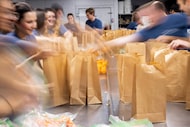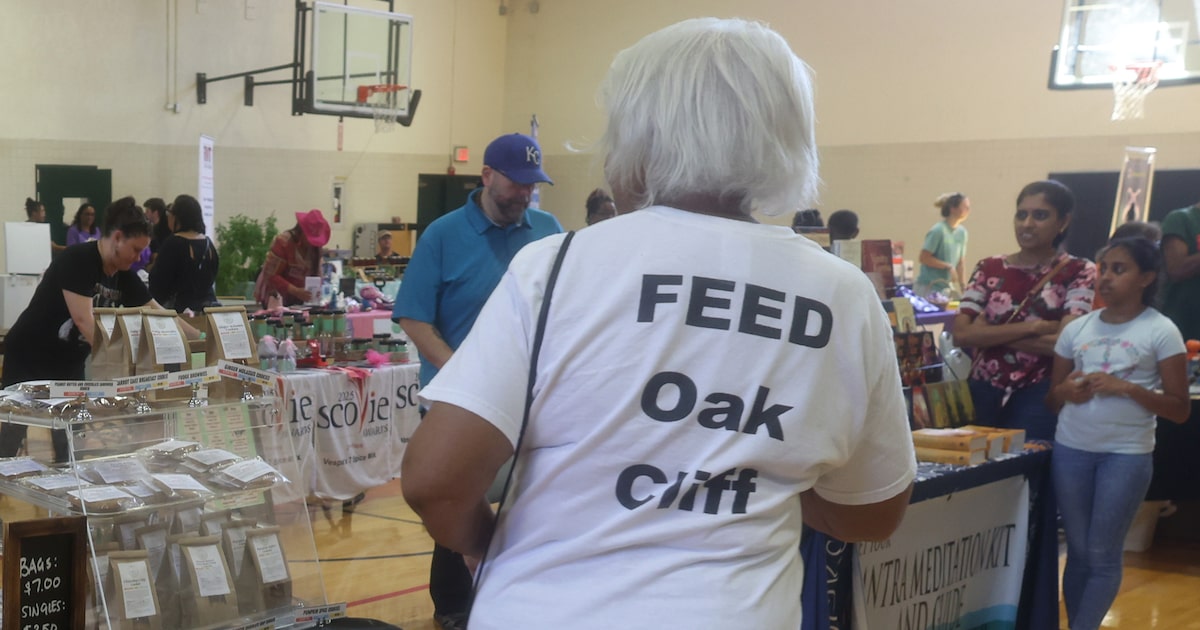Helen Dulac’s homemade jams and jellies lined a long table framed with award ribbons for her Peppers and Petals brand. She’s an urban farmer who was at a weekend health and food fair in Oak Cliff, but not only to sell her homegrown goods.
Dulac, of Grand Prairie, works at the Dallas nonprofit Grow North Texas, which aims to improve food systems. She was one of dozens of vendors who set up shop at the 10th annual VegFest on Sept. 21, hoping to connect more people with food.
As an instructor, Dulac helps people become more successful farmers.
“You don’t want to grow tomatoes in the winter, right? You grow tomatoes when it’s warm,” she said. “I taught a class about that lesson Friday night.”
Eat Drink D-FW
Dulac is among a growing population of people who strive to have control over their food. The idea was born from a grassroots movement recognized by sustainability experts and the federal government as “food sovereignty,” the right of people to define and control their food and agriculture systems.
“Starting from seed all the way till when it produces that fruit or that crop and then even being able to take that and make it into an extra thing, such as the jam,” Dulac said. “It’s the whole cycle. It makes me feel connected to the Earth, to nature and also to my food.”

Business was steady at the “Slammin Jammin” booth as Feed Oak Cliff hosted Dallas VegFest, a health and food fair, at Kiest Park Recreation Center, 3081 S. Hampton in Dallas, on September 21, 2025.
Steve Hamm / Special Contributor
Feed Oak Cliff, a nonprofit focused on ending food deserts, hosted VegFest at Kiest Park Recreation Center. The event was designed to give resources and support to a community that lacks sustainable access to healthy food.
A food desert is an urban area “low-access community” where at least 33% of the population lives more than 1 mile from a supermarket, or a rural area where residents have to travel more than 10 miles to access healthy fresh food, according to the U.S. Department of Agriculture’s definition.
Related

Dulac grows vegetables and fruit trees in her backyard garden, one that the USDA recognizes with its own farm number.
“My backyard is officially a farm in the eyes of the government,” Dulac said. “There is a small group of people in the USDA who are trying to elevate urban farming. Getting people to be able to grow closer to home increases our food security.”
Food access for all
Though the name VegFest seems to invite vegans and vegetarians, Anga Sanders, Feed Oak Cliff’s founder and CEO, said anyone is welcome at the fair, no matter what types of food they like to eat. Vendors sold cinnamon rolls, dumplings, fruits and vegetables. Oak Cliff Veggie Project handed out fresh produce.
Specialists on chair yoga and meditation spoke with attendees and taught classes, discussing the relationship between healthy eating, breathing techniques and a holistic lifestyle.
Donald Moy, a vegan of 30 years, spoke with shoppers at the fair about the health benefits of following a vegetarian diet.
“The same vitamins and nutrients you can get from animal flesh are the same thing you can get from plant sources,” said Moy, who is president of the Black Vegetarian Society of Texas.
Since the early 2000s, the society has targeted its cooking classes and education resources for Black communities, which statics show are disproportionately impacted by food deserts.
“There have been other organizations that are geared toward vegetarianism, but often we don’t feel comfortable to be a part of it,” Moy said. The group specifically helps Black families understand the important link between their health and what they eat.

Event attendees make their way through a maze of booths as Feed Oak Cliff hosted Dallas VegFest, a health and food fair which was held at Kiest Park Recreation Center, 3081 S. Hampton in Dallas, on September 21, 2025.
Steve Hamm / Special Contributor
Food deserts in Oak Cliff, a predominantly Hispanic and Black community, have decreased in recent years through the work of volunteers like Sanders.
VegFest is just part of her work to bring food equity to her corner of Dallas. She’s also tried to recruit traditional grocers to Oak Cliff for years to help fill the gaps in healthy food access in her neighborhood.
“I do my grocery shopping on the other side of town,” Sanders said. “I didn’t think it was right to have to drive 25 miles round trip to do that.”
Lack of economic investment in areas such as Oak Cliff and throughout southern Dallas contributed to the food deserts.
That’s another reason why Dallas VegFest is in its 10th year: Sanders has been working to change a misconception about her home for years through community action.
“There are people who have never been to Oak Cliff,” Sanders said. “They think it is a crime-ridden, high-poverty … uneducated [area]. I thought I needed to change the perception, in addition to providing nutrition education for the community.”
Federal government rollbacks
Oak Cliff’s perennial fight against food insecurity comes amid the Trump administration’s rollback of federal support for food programs.
The White House announced this month that it’s ending the USDA’s annual report on hunger in America, stating that it had become “overly politicized” and “rife with inaccuracies.”
The decision comes two and a half months after President Donald Trump signed legislation sharply reducing food aid to the nation’s hungriest.
The Congressional Budget Office estimates the tax and spending cuts signed into law in July mean 3 million more people will not qualify for food stamps, or SNAP.
North Texas food providers were scrambling to find a way to fill a $9.2 million funding gap created by cuts in March to two USDA programs that bought food from local farmers.
Related

The USDA froze more than $1 billion nationally from the Local Food for Schools Cooperative Agreement and the Local Food Purchase Assistance Cooperative Agreement programs, which were created during the pandemic to help food banks get more fresh food and boost farmers’ revenue.
Texas is home to more hungry people than any other state, the second year in a row it has held the national spot, according to data released in May by Feeding America, a national hunger nonprofit.
Dallas-Fort Worth ranks third among U.S. metro areas for the number of people facing hunger, according to the Map the Meal Gap study, which analyzed 2023 data and highlighted a complex reality for Texas and one of its largest metro areas.

Erin Wakefield replaces an empty box with fresh veggies at the Oak Cliff Veggie Project booth. Feed Oak Cliff hosted Dallas VegFest, a health and food fair which was held at Kiest Park Recreation Center, 3081 S. Hampton in Dallas, on September 21, 2025.
Steve Hamm / Special Contributor
A community development dream
Despite the uphill climb to Sanders’ dream for food sovereignty in Oak Cliff, she said her vision for a three-in-one community development is crystal clear.
She envisions a community grocery store, a restaurant that serves healthy grab-and-go meals and a classroom to train workers, who would be hired from the community to staff the grocery and restaurant. It would also host classes on business management, tax prep and food regulations.
The space would also be an opportunity to have a commercial kitchen in the area where cooks can rent the space and create products they can sell to more people. “There are a lot of good cooks in this area,” she said. “I am not one of them.”
The store and restaurant could be a bright spot in Oak Cliff’s food desert, Sanders said, a financial, physical and psychological ray of hope.
“If you grow up and you live in a community where you’re always treated as less than, and you don’t have as many options, and nobody’s interested in giving you any options, either for what to eat or how to start a business, I think that does something to you mentally,” she said. “To provide those resources would be uplifting to the community. We are worthy of having these opportunities.”
Staff writer Maria Salette Ontiveros and The Associated Press contributed to this report.
